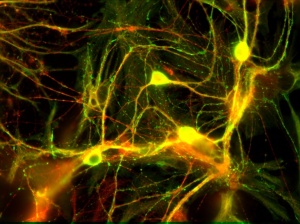We invite you to a Seminar on “Data Fusion in Computational Neuroscience: Challenges and Prospects in Analysis of Multi-View, Multimodal, Massive Data” with Prof. Andrzej Cichocki, RIKEN Brain Science Institute (JAPAN).
When: August 25, 2015, 13.30 – 15.00
Where: Room TBD, TROC-3

Neuroscience applications are greatly developing world-wide. Image courtesy of sop.infria.fr (click photo to enlarge)
Seminar Abstract
With the increasing availability of various sensor technologies, we now have access to large amounts of multi-block (also called multi-set, multi-relational, or multi-view) data that need to be jointly analyzed to explore their latent connections and extract hidden components. Medical recording and diagnostic devices play an important role in generating such massive data.
In order to explore spatial, temporal, and spectral differences and similarities in multi array, multi-block, bio-signals and images, we need to develop a variety of strategies based on multi-way component analysis and tensor decompositions.
In this talk Prof. Cichocki will first provide a brief review of his previous and current research related to blind signal processing and linked component analysis methods for the joint analysis of such multidimensional data with a focus on computational neuroscience applications, including brain computer interface, aging of a human brain and early diagnosis of mental disorders, e.g., prediction of clinical onset of Alzheimer disease. Illustrative examples will be given to demonstrate their effectiveness for biomedical data analysis.
Then Andrzej will discuss their important extensions and generalization to multi-block tensor decompositions in other possible applications. I show how constrained multi-block tensor decomposition methods are able to extract common components that are shared by all blocks, by incorporating the multi-way nature of data.
Special emphasis will be given to challenges and future perspectives, especially related to big data processing.
Speaker Introduction
Andrzej Cichocki received the MSc (with honors), PhD and Dr Sc (Habilitation) degrees, all in electrical engineering, from Warsaw University of Technology (Poland). Since 1972, he worked in the Institute of Theory of Electrical Engineering, Measurement and Information Systems at the Warsaw University of Technology, where he became a full Professor in 1995. He spent several years at University Erlangen (Germany) as an Alexander-von-Humboldt Research Fellow and Guest Professor.
In 1995-1997 he was a team leader of the Laboratory for Artificial Brain Systems, at Frontier Research Program RIKEN (Japan). He is currently a Senior Team Leader and Head of the laboratory for Advanced Brain Signal Processing, at RIKEN Brain Science Institute (JAPAN).
He has authored more than 300 technical journal papers and 4 monographs (books) in English (two of them translated to Chinese). He serves as an Associated Editor of IEEE Transactions on Neural Networks and Learning Systems, IEEE Trans. on Cybernetics and IEEE Trans. Signals Processing and he was as a founding Editor in Chief for Journal Computational Intelligence and Neuroscience.
Currently, his research focus on multiway analysis, tensor decompositions, blind sources separation, brain machine interface, EEG hyper-scanning, human to robot interactions and their practical applications. According to Google Scholar his publications currently report over 25,000 citations (his h-index is 69).

